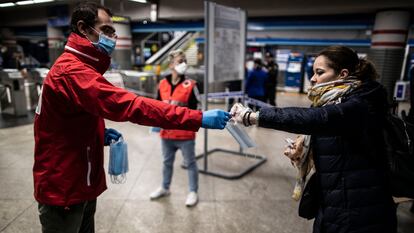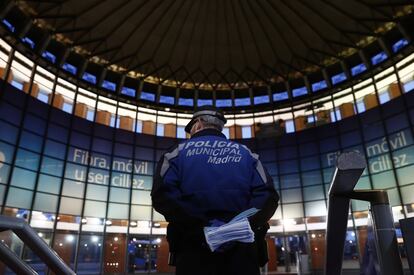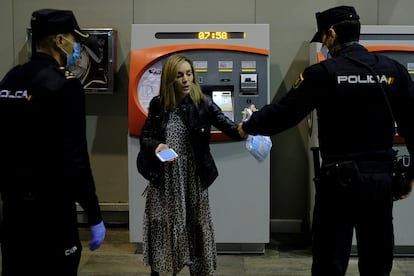‘I don’t know why the heck we have to go back if there’s no way of staying apart’
Thousands of people are returning to work in Spain amid controversy over whether it is too early to lift the strictest measures of coronavirus confinement

At Príncipe Pio station in Madrid, on the Cercanías commuter train network, only the hum of escalators and the noise of arriving and departing trains could be heard on Monday morning. A dozen National Police officers were handing out more than 5,000 face masks just at this one station. Ten million masks will be handed out in total, now that some of Spain’s non-essential workers are returning to work after a two-week period during which the economy was placed in “hibernation” mode.
Rafael Antúnez, 53, did not need to take one. He arrived at the station around 6am with a mask used for painting that he had bought months earlier at a hardware store. “Before all this happened,” he said about the purchase, as he made his way to a construction site in the Madrid municipality of Pozuelo de Alarcón. “I don’t know why the heck we have to go back if there’s no way of staying apart.”
Asked whether he was afraid, Antúnez shrugged his shoulders. “I just hope that my workmates also work with a face mask,” he says. “If not, we’re screwed.”
Industry and construction are the main sectors resuming normal activity, although retail stores, restaurants, cultural venues and leisure centers remain closed as part of the general confinement measures in place since March 14.
I just hope that my workmates also work with a face mask. If not, we’re screwedRafael Antúnez, construction worker
Minutes later, a commuter named Irud passed by and said he was going back to work as a gardener in Las Matas, northwest of the capital. “I don’t know if it’s essential or not, but they keep calling me,” he said, hands in his pockets and half his face covered with a neck warmer. “How can you leave plants for so long without looking after them? It would be a disaster.”
A woman who said her name was Fátima did not stop to talk, but offered some information as she walked by. “I have never stopped working. I am a care worker at a residence,” she said. Asked about the situation there, she did not answer, and instead rushed to catch a train heading to Atocha station.
At Atocha, several security guards watched over the train platforms to make sure commuters remained an appropriate distance apart. Although there was more movement here than at other stations, the situation remained unusually quiet, with no sign of the bustle typical of one of the city’s busiest transportation hubs.

Most of the commuters accepted the offered face masks even though they were already wearing one. Some covered their faces with scarves and homemade masks, while others wore none at all. Ismael Rubio, a bricklayer waiting for a train to Collado Villalba, said he did not believe in their effectiveness. “I don’t put [the mask] on because it doesn’t do anything,” he asserted. “Once you touch your cellphone or clothes, they’re stained.” Rubio said he was not worried about contracting the coronavirus, but was scared about infecting the elderly people he lives with. “But I don’t think this does much,” he said, showing the mask he picked up at the station, then placing it in his pocket.
According to the authorities, face masks will be distributed at public transportation hubs for a few more days, particularly in the eight of Spain’s 17 regions where Easter Monday is a public holiday.
Many of the people using public transportation on Monday were the same essential workers who were already using it before the temporary “hibernation” period – doctors, security guards, supermarket cashiers. Asier, for example, is a security guard who complained about having to wait 12 minutes for his train. “These frequencies don’t help maintain social distancing,” he noted.
But at 8am, in the middle of rush hour, the normally packed Metro train cars looked half-empty. Outside, police officers continued to hand out masks at different entrances, while two Red Cross volunteers gave out masks inside the train cars. “We are handing out [masks] at all the transportation hubs, and at the busiest stops,” said Carmen, one of the volunteers. By noon on Monday, 72,323 passengers had used the Metro train system, 31% more than Monday of last week but 87% less than the same day last year, according to figures published by Madrid Metro on its official Twitter account.
Building sites
Work on construction sites has resumed in Madrid. One such site is on a building that will be turned into a hotel on Montera street near Gran Vía, in the heart of the capital. “We have all returned to work today,” said Florin, a worker, wearing a traditional yellow vest and a less traditional face mask. The noise of the machines and workers’ conversations were the only sounds breaking the silence that hung over Madrid’s famous Puerta del Sol. Both spots are normally packed with people but on Monday they were nearly completely deserted.
Franklin Rodríguez was also going back to work on a building site. “We stopped for 15 days, but today we are going back. They have given us gloves and masks. I’m not afraid to return, we are protected,” he said as he waited at Puerta del Sol for a Metro train to take him to Iglesia station. Other workers also returned to a site on La Encomienda street, in Madrid’s La Latina neighborhood, where a new hostel is being built. “We start today, everyone has a mask,” said Herminio, directing a colleague as he handled construction material.
Few commuters in Seville
In the southern Spanish city of Seville, there were few commuters on the Metro line, where volunteers from the Civil Protection service, supported by state security forces, began handing out face masks at 6am. Most of the passengers on their way to work already had protective gear that they brought from home, and masks were only being handed out to people without them and who would not be provided with one at their workplace, according to one of the security officers.

There was more activity at Santa Justa station, which is one of the main transportation hubs of the city. Police officers there handed out masks to several passengers who did not have any protective gear, such as María, who works at a law firm and was commuting from the Bellavista neighborhood to the south of the city. “I was not sure if masks were going to be handed out or if they would have one for me when I arrived [at work],” she said. In the southern region of Andalusia, up to 1.8 million masks are expected to be distributed in 365 public transportation hubs in eight provinces. Out of this figure, 434,000 will be handed out in the city of Seville.
Castellón’s ceramics industry “slowly” resumes production
The reactivation of the ceramics industry has been slow and “different in each company,” according to the Spanish Tile and Ceramic Pavement Association (ASCER). Sources from ASCER indicated that the sector is “very far from returning to normal” and that activity will only resume slowly in the next two months. Monday is also a public holiday in the province of Castellón, the heart of Spain’s ceramics industry, which has slowed the return to business.
Sources from ASCER said that the sector will have to adjust production according to the demands of their clients, meaning it “will be a very long and complicated period for companies.” According to these sources, demand for ceramic tiles “has fallen dramatically in the last few weeks, because our main markets, like Spain, the European Union and the United States, have taken contingency measures to slow the spread of Covid-19.”
ASCER explained that “international producers who have not had to stop production” represent a major threat to the Spanish ceramics sector. The industry has called for more funding, urgent liquidity measures and the postponement of tax payments, among other measures.
English version by Melissa Kitson.
Tu suscripción se está usando en otro dispositivo
¿Quieres añadir otro usuario a tu suscripción?
Si continúas leyendo en este dispositivo, no se podrá leer en el otro.
FlechaTu suscripción se está usando en otro dispositivo y solo puedes acceder a EL PAÍS desde un dispositivo a la vez.
Si quieres compartir tu cuenta, cambia tu suscripción a la modalidad Premium, así podrás añadir otro usuario. Cada uno accederá con su propia cuenta de email, lo que os permitirá personalizar vuestra experiencia en EL PAÍS.
¿Tienes una suscripción de empresa? Accede aquí para contratar más cuentas.
En el caso de no saber quién está usando tu cuenta, te recomendamos cambiar tu contraseña aquí.
Si decides continuar compartiendo tu cuenta, este mensaje se mostrará en tu dispositivo y en el de la otra persona que está usando tu cuenta de forma indefinida, afectando a tu experiencia de lectura. Puedes consultar aquí los términos y condiciones de la suscripción digital.








































